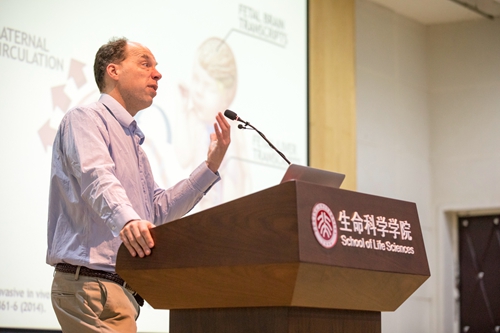[Peking University Global Fellowship] World-Renowned Biophysicist Stephen Quake visits PKU
Nov 20, 2018
Peking University, Nov. 16, 2018: Invited as a Peking University Global Fellow, Professor Stephen Quake, world-renowned biophysicist and genetic engineer, member of United States National Academy of Sciences (NAS) and the dean of the Bioengineering Department of Stanford University, visited Peking University from November 5th to 6th, 2018. During his visit, Professor Stephen Quake delivered an academic report on the topic of “The Cell is a Bag of RNA”, and communicated with youth scholar representatives from Biomedical Pioneering Innovation Center (BIOPIC).
 Professor Stephen Quake
Professor Stephen Quake
On the morning of November 6th, Quake visited BIOPIC and discussed the frontier of single-cell technology with the researchers. In the afternoon, Quake delivered an academic report named “The Cell is a Bag of RNA” at the School of Life Sciences, PKU. The report was hsoted by Professor Xiaoliang Sunney Xie. Researchers and students from the School of Life Sciences, Academy of Advanced Interdisciplinary Studies, Peking University Health Science Center and other institutes attended the lecture.
As Quake pointed out in the report, single-cell RNA sequencing technologies might shed light on the solution to health issues including contagious diseases and genetic disorders, which have been vexatious problems worldwide for decades. Quake therefore reviewed the development of various bioengineering technologies he worked on. Microfluidics was particularly brought up for its high applicability in sequencing for industrial biotechnology.
Quake highlighted his research on the treatments of contagious diseases and prenatal diagnosis with the state-of-the-art technology allowing for high-throughput single-cell sequencing. On the problem of premature birth, Quake Lab has identified nine types of cell-free RNA related to gestational age from the blood of the pregnant, and proved that seven types have significantly higher expressions in the case of premature birth. Based on this, Quake Lab successfully developed a predictive test for premature birth with an accuracy as high as 80%.
Quake has made groundbreaking contributions to microfluidics, genomics and other fields. He gratefully admitted that he had benefited a lot from his early training as a physicist, for physics has a profound tradition in accurate measurement. Quake was convinced that, as the measurement of physical and biochemical phenomena keeps improving, numerous amazing discoveries, even new principles, will be explored and exploited. He practices such faith through his entire life: all the technologies he developed, such as single-molecule DNA sequencing, microfluidics, single-cell RNA sequencing, ultra-high-throughput DNA sequencing, share the same goal of exposing the micro-world of biological activities through accurate measurement. Quake brought accuracy from physics into biology. With his innovative work, Quake significantly promoted scientific and medical research.
After the report, Quake discussed frontier researches of genomics with Professor Xiaoliang Sunney Xie, Professor Huang Yanyi, Professor Su Xiaodong, Professor Rao Yi, Researcher Wei Wensheng and other scholars.
Stephen Quake's Bio:
Stephen Quake, born in April, 1964, is a world-famous biophysicist, expert in bioengineering and one of the major leaders of international genomics. He is a member of United States National Academy of Sciences (NAS), National Academy of Engineering (NAE), National Academy of Medicine (NAM) and American Academy of Arts & Sciences. Quake was the dean of the Bioengineering Department of Stanford University and is now the co-president of Chan Zuckerberg Biohub.
Quake received his PhD in Physics from Oxford University in 1994 and worked as postdoctoral researcher in Steven Chu’s lab on single-molecule biophysics. He joined Caltech at 26 and was appointed Thomas and Doris Everhart Professor in Applied Physics and Physics. Quake returned to Stanford University in 2005. He established the new Bioengineering Department and was selected into Howard Hughes Medical Institute. He is now Lee Otterson Professor in the School of Engineering and Professor of Bioengineering, of Applied Physics, and (by courtesy) of Physics.
Quake has made great contributions to microfluidics, including his invention of microfluidic large-scale integration design and wide applications in structural biology, drug development and molecular affinity measurements. Additionally, he also contributed to genomics, including applying single-molecule DNA sequencing to non-invasive prenatal prognosis and new methods of sequencing and analysis towards individual immune system.
Written by: Wang Xi
Edited by: Huang Yadan, Xu Liangdi
Source: PKU News (in Chinese)
